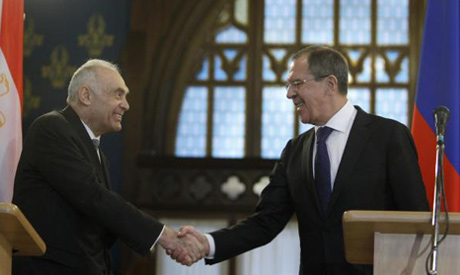
Russia's Foreign Minister Sergei Lavrov (R) shakes hands with his Egyptian counterpart Mohamed Kamel Amr during a news conference in Moscow December 28, 2012 (Photo: Reuters)
Egyptian Foreign Minister Mohamed Kamel Amr denounced Israel's recently-announced plan to build new settlements in the occupied Palestinian territory, saying it will demolish any efforts to kick-start peace negotiations.
"The Palestinian issue was one of the most important issues we discussed, as Egypt is currently focused on implementing the terms of the Palestinian reconciliation deal," Amr told a news conference after meeting Russian counterpart Sergei Lavrov on Friday in Moscow.
He added that the settlement policy of the Israeli government will "destroy any opportunity" to revive the peace process in the region and reach a long-lasting, political solution with the Palestinian side.
The Egyptian Foreign Ministry on 19 December condemned Israel's plan to build 2,610 new settler units in east Jerusalem and the West Bank.
This message was relayed when Ambassador Alaa Eddin Youssef, the ministry's Israel department head, held a meeting with the Israeli Ambassador to Egypt, Yaakov Amitai.
The plan involves building 2,610 homes in East Jerusalem and tenders for 1,048 units in the West Bank just before the UN meeting in response to the UN General Assembly vote on 29 November to recognise Palestine as a non-member state.
The United Nations and UN Security Council powers condemned Israel's rise in settler construction in occupied Palestine as a threat to flagging peace efforts.
Russia and China warned Israel against building new settler homes, describing the Israel-Palestinian peace process as in "deep freeze" and pointing out that it will be exacerbated by the settlement approvals.
The European Union's foreign policy chief Catherine Ashton said she was "strongly opposed" to Israel's ramped-up settlement building, particularly around East Jerusalem, which she described as "extremely troubling."
UN ambassadors from Britain, France, Germany and Portugal highlighted European fears over the peace stalemate and stressed that their governments "strongly oppose" the Israeli construction plans.
Non-aligned members of the Security Council — Azerbaijan, Colombia, India, Guatemala, Morocco, Pakistan, South Africa and Togo — read their own statement of condemnation. China also joined the protest, before all were rebuffed by Israel.
The United States traditionally protects Israel at the Security Council. Using its power as a permanent member, it has vetoed many resolutions criticising Israel, including over settlements.
US Ambassador to the UN Susan Rice did not join the public attack on Israel, but slammed the "provocative" act of the United States' major ally during closed UN Security Council consultations.
However, in a statement released by his office, Israeli Prime Minister Binyamin Netanyahu claimed that Jerusalem has been the capital of the Jewish people for "3,000 years," adding that his government will continue its plans for settlement construction in Jerusalem.
Short link: